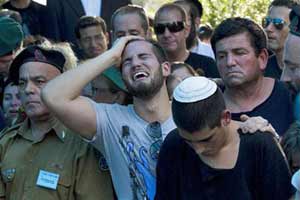|
 Relatives and friends of Lieutenant-Colonel Dov Harari react during his funeral at the military cemetery in the coastal city of Netanya, Israel, 4 Aug 2010. A clash between Lebanese troops and Israeli soldiers Tuesday left Harari dead and was the most serious since Israel and the Iranian-backed Lebanese group Hezbollah fought a brief war in 2006. |
UNIFIL political advisor Milos Struger: "Our immediate priority of UNIFIL is to restore calm in the area. UNIFIL has been in contact with the top leadership with the Lebanese Army and with the command of the Israeli army urging maximum restraint."
Tensions soared Tuesday when a Lebanese sniper killed a senior Israeli officer as Israeli forces pruned trees in a disputed border area. Israel retaliated with tank fire and an air strike, killing two Lebanese soldiers and a journalist. It was the most serious border clash since the Lebanon War four years ago.
UNIFIL later determined Israeli forces were in their own territory, denying Lebanese claims that they had crossed the border. The US State Department described the Lebanese fire on Israeli troops as "wholly unjustified and unwarranted."
In Jerusalem, Israeli Prime Minister Benjamin Netanyahu issued a stern warning.
He said Israel holds the government of Lebanon responsible for what he described as "the violent provocation" against Israeli troops. Mr. Netanyahu warned Lebanon not to test Israel's resolve, saying there would be a harsh military response to any further attacks.
Lebanese officials continue to insist Israeli forces crossed into Lebanese territory and the Lebanese Army acted in self-defense.
The incident raised fears of another war. In 2006, a deadly cross-border raid by Hezbollah guerrillas sparked a 34-day Israeli air and ground assault on Lebanon.
Israel-Lebanon border tense after deadly clash
Israeli, Lebanese forces clash on border
Israeli settlers clash with Palestinians in West Bank
Obama, Netanyahu working to mend US Israeli relationship
(來(lái)源:VOA 編輯:陳丹妮)
